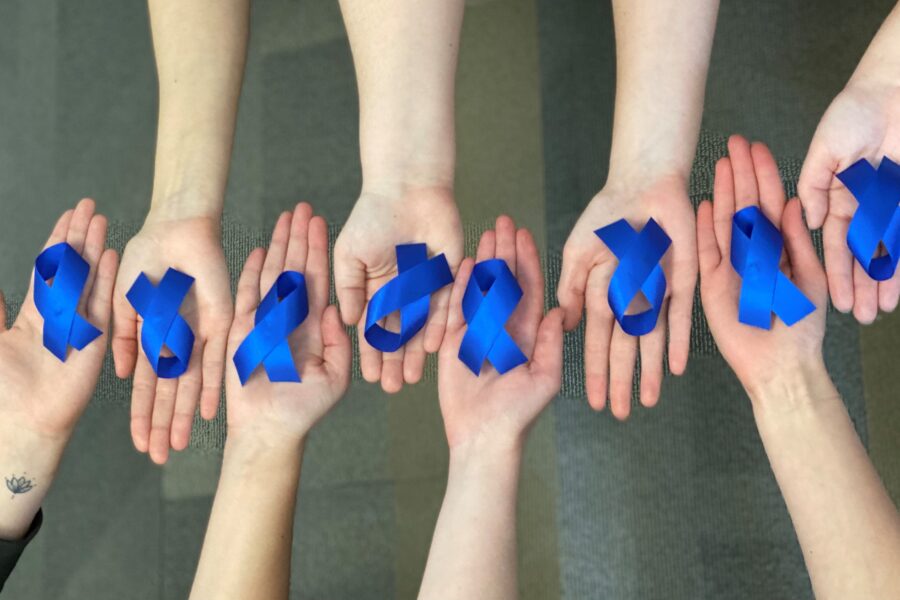by Rose Bishop and Ashlynn Larsen, UNMC genetic counseling students
According to the American Cancer Society, it is estimated that 151,030 people will be diagnosed with colorectal cancer this year in the United States. Colorectal cancer is the third most common cancer; 1 in 23 men and 1 and 25 women will be diagnosed with colorectal cancer in their lifetime. March is National Colorectal Cancer Awareness Month, and there is no better time to learn about colorectal cancer screening, find out if you are at an increased risk to develop colorectal cancer, and to get involved!
When should I start screening for colorectal cancer?
Most people are at an average risk to develop colorectal cancer. Those at average risk should begin colorectal cancer screening at 45 years old and continue to undergo screening until age 75. People who are between 76 and 85 years of age should consult with a health care provider to determine if continuing screening is right for them. Those who are 86 years of age or older do not need to be screened.
Screening options for colorectal cancer:
- Colonoscopy – Repeat every 10 years
- Flexible sigmoidoscopy – Repeat every 5-10 years
- CT colonography – Repeat every 5 years
- Stool-based screening – Repeat every 1-3 years
Am I at an increased risk to develop colorectal cancer?
Some people are at an increased risk to develop colorectal cancer based on their personal and/or family history. It is estimated that 5-10% of colorectal cancer is hereditary, meaning that an individual is born with a harmful change in one of their genes that increases their lifetime risk to develop colorectal cancer. You may be at an increased risk for developing colorectal cancer if you have a blood relative who was diagnosed with colorectal cancer under 50 years of age, multiple relatives in your family who have been diagnosed with colorectal cancer, or a personal and/or family history of colon polyps. If you are found to have a harmful gene change or a personal/family history that increases your risk for colorectal cancer, you may qualify for more frequent colorectal cancer screening and screening at a younger age (before 45 years).
Get Involved
Help spread awareness, education, and advocacy for colorectal cancer screening and support in your area!
- March 4th, 2022, is Dress in Blue Day to support those affected by colorectal cancer
- Social Media: Share your support on social media with #BlueforCRC on Twitter and other platforms on Dress in Blue Day (and any other day)
- Stay Informed:
- Learn more about the policies for Colorectal Cancer and Screening. American Cancer Society Guidelines for Screening
- Advocate for updates to Nebraska (as well as federal) laws to match the recommendations by NCCN.
- Donate: There are a number of ways donations are utilized for Colorectal Cancer. FightCRC, FORCE, American Cancer Society, and St. Jude’s Children’s Hospital are all examples of organizations that accept donations. By donating to one of these organizations you can help…
- fund accredited research pertaining to colorectal cancer.
- advocate for new updated screening methods in your state.
- support those going through treatment and their families.
- Volunteer: Many organizations have opportunities for individuals to become advocates in their community and online. Some opportunities for volunteering include sharing your story, distributing resources, and outreach in your own town or community!
Support Groups and Organizations
There are several organizations operating at the regional, state, and national level that are involved in supporting and advocating for colorectal cancer patients and their families. Within these organizations, there are opportunities to learn more about colorectal cancer, connect with other patients and families, and volunteer! Below is a list of organizations and support groups for those affected by colorectal cancer:
Additional Resources
Interested in learning more? Listed below are additional sources to learn more about Colorectal Cancer

This is great information with a lot of helpful resources. It’s important to stay on top of scheduling these examinations as catching cancer early is critical for successful treatments. .